‘Poetry’ Category Archives
Apr
Our Daily Prince: Music to Move Forward With and Tanya Olsen’s Poem “54 Prince”
by Lefort in Music, Poetry

Since it’s Throwback Thursday, we will continue to obsess the loss of Prince.
There are various ways to make it through. On the music front, for those who love Prince’s music, we encourage you to check out Unknown Mortal Orchestra who recently Princed-up the Soho stage in Santa Barbara. Their most recent album, Multi-Love, seems at times primarily an homage to Prince (though you will hear other influences), and their concerts repeatedly reminded of his Prince-ness. To get a feel check out below the song and Prince-influenced video for Ur Life One Night. UMO are well worth your time, and particularly when grasping for ways to move forward.
For something completely different and to help take your mind off more morose matters, check out Tawnya Olsen’s great poem 54 Prince below. Featured in the Best American Poetry of 2015 collection, Olsen writes therein about the poem: “‘54 Prince‘ began as a high five to scientists for coming up with such an awesome term as “Goldilocks planet.” I thought the phrase gave us narrative-craving humans an immediate idea of what the planets were like but still kept them mysterious…. Why Prince? I wondered what else all these ‘good enough’ planets would need to survive. Wouldn’t life be easier if each planet had its own Prince–brilliant, a little off, possibly extraterrestrial anyway?”
We imagine Prince inhabiting heaven and holding up at least 54 planets. “There’s worries now the fish sing but there won’t be worries long.” Amen.
54 Prince
There exist 54 Goldilocks planets
54 planets not too hot
54 planets not too cold
54 planets where the living
is juuuuuust right
in that particular planetary zone
54 planets like Earth
but not Earth Similar
not the same 54 planets close
but different Different
except for Prince
Assless Pants Prince
High-Heel Boots Prince
Purple Rain Prince
Paisley Park Prince
I Would Die For You Prince
Ejaculating Guitar Prince
Jehovah’s Witness Prince
Needs A New Hip Prince
Wrote Slave On His Face Prince
Took An Unpronounceable Symbol For His Name Prince
Chka Chka Chka Ahh Prince
These 54 Prince swallow 54 worries
The 54 worries become 54 songs
54 songs made of 54 bars 54 bars
using 54 chords 54 downbeats
where they pick up the worries
54 off-beats to lay the worries down again
54 worried skank-beat Prince
birth 54 worrisome funk-drenched songs
Once an Earth year the Prince
gather around Lake Minnetonka
When the cherry moon smiles
they thrust under their heads
Under the water the Prince sick up
the old worries Under the water
worry sacks rise empty again
It takes a worried man the Prince say
to sing a worried song
while beneath the surface of Lake Minnetonka
the perch in the shoals
and the gobies in their holes
nibble at the worries
our skimmed from the top worries
scraped from the bottom worries
spooned from the middle good enough worries
There’s worries now the fish sing
but there won’t be worries long”
Tanya Olson lives in Silver Spring, MD. 54 Prince was originally published in The Awl. If you like Prince-themed poetry, support the author by buying her first book, Boyishly, which was published by YesYes Books in 2013 and won an American Book Award in 2014.
Apr
Akron/Family: Watch New Video for “Until the Morning” and Live Performance of “Samurai” From New Album “Sub Verses”
by Lefort in Music, Poetry

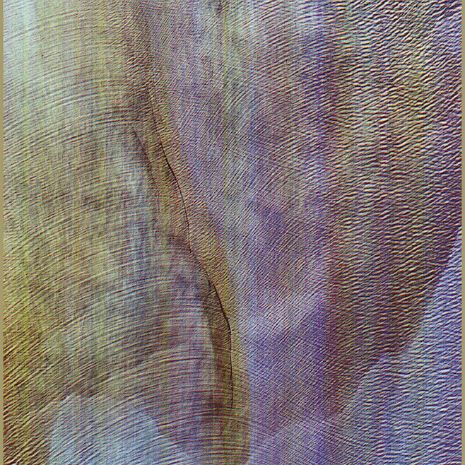
Cover art by Stephen O’Malley of Sunn O)))
Akron/Family came through town earlier this year and wowed the crowd at Muddy Waters with a decidedly prog/heavy musical attack that is prominent on their new album Sub Verses on Dead Oceans. The band’s members (Dana Janssen, Seth Olinsky, and Miles Seaton) are each supremely talented musicians, and they quickly laid waste to any crowd concerns that the band wouldn’t bring their full A-game to the tiny Muddy. And during the second half of the show they let down their heavy musical guard and let their big hearts and minds shine through on a few songs in particular. It’s at these points in Akron/Family shows that the band goes beyond just being superlative and inventive players, and you discern the intelligence that sets them apart from many others playing in this field.
In the last couple of days, two video vignettes have been released that capture well the Akron/Family about which we speak. The band has just released its official video for Until the Morning, a superb ballad off the new album, the lyrics of which ring as if they might be best listened to on a Sunday morning (and every morning thereafter). In addition, the folks at Audio-Files have released an outstandingly-captured live performance (at the “Homestead Crater”) by the band of their song Samurai, which is an adaptation of a poem by the praiseworthy poet Robert Pinsky (U.S. Poet Laureate from 1997-2000). Check out the band’s fine performance below and catch them on tour, the dates of which can be found HERE. If you missed them at the Muddy, they will play The Echo in LA on May 8th. Pinsky’s original poem is set forth at bottom.
And for heavensake, go buy Sub Verses at any of these sites: iTunes http://smarturl.it/akronitunes // Amazon http://smarturl.it/akronamazon // SCD Bundles http://smarturl.it/akron_scd // Indies http://smarturl.it/akron_indies
Samurai Song
When I had no roof I made
Audacity my roof. When I had
No supper my eyes dined.
When I had no eyes I listened.
When I had no ears I thought.
When I had no thought I waited.
When I had no father I made
Care my father. When I had
No mother I embraced order.
When I had no friend I made
Quiet my friend. When I had no
Enemy I opposed my body.
When I had no temple I made
My voice my temple. I have
No priest, my tongue is my choir.
When I have no means fortune
Is my means. When I have
Nothing, death will be my fortune.
Oct
And Now For Something Completely Different…Watch Sharon Olds Read Her Poem “Diagnosis”
by Lefort in Poetry

Take a minute (literally) to watch noted poet Sharon Olds read her poem Diagnosis for PBS below. Here’s hoping for an epidemic of incurable humor.
Jun
Winner of the Pulitzer Prize for Poetry
by Lefort in Poetry
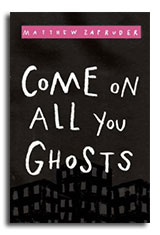
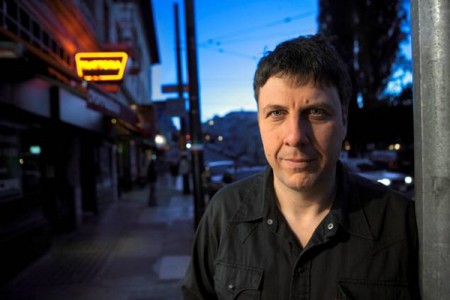
Matthew Zapruder recently won the Pulitzer Prize for Poetry with his book, Come on All You Ghosts.
We highly recommend this collection. Zapruder takes the everyday happenstance and applies boatloads of texture to render haunting and whimsically simple vive-vignettes. Check out one of the poems from this collection, Global Warming below.
“Global Warming”
In old black and white documentaries
sometimes you can see
the young at a concert or demonstration
staring in a certain way as if
a giant golden banjo
is somewhere sparkling
just too far off to hear.
They really didn’t know there was a camera.
Cross legged on the lawn
they are patiently listening to speeches
or the folk singer hunched
over his little brown guitar.
They look as tired as the young today.
The calm manner in which their eyes
just like the camera rest
on certain things then move
to others shows they know
no amount of sunlight
will keep them from growing suddenly older.
I have seen the new five dollar bills
with their huge pink hypertrophied numbers
in the lower right hand corner and feel
excited and betrayed.
Which things should never change?
The famous cherry trees
I grew up under
drop all their brand new buds
a little earlier each year.
Now it’s all over before the festival begins.
The young.
Maybe they’ll let us be in their dreams.
May
John Updike–Peggy Lutz, Fred Murth
by Lefort in Poetry

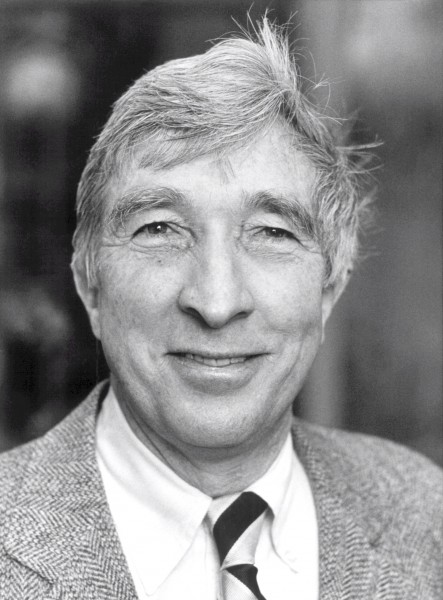
It’s well known that John Updike was one of America’s best fictioneers (long and short). What is less well known is that he was also one of our better poets. Having written about Mickey Newbury’s album and song Heaven Help the Child below, we were struck by one of Updike’s poems (written shortly before his passing) on childhood, hometowns and aging. Check out “Peggy Lutz, Fred Murth” below.
“They’ve been in my fiction; both now dead,
Peggy just recently, long stricken (like
my Grandma) with Parkinson’s disease.
But what a peppy knockout Peggy was! –
cheerleader, hockey star, May Queen, RN.
Pigtailed in kindergarten, she caught my mother’s
eye, but she was too much girl for me.
Fred – so bright, so quietly wry – his
mother’s eye fell on me, a “nicer” boy
than his son’s pet pals. Fred’s slight wild streak
was tamed by diabetes. At the end,
it took his toes and feet. Last time we met,
his walk rolled wildly, fetching my coat. With health
he might have soared. As was, he taught me smarts.
Dear friends of childhood, classmates, thank you,
scant hundred of you, for providing a
sufficiency of human types; beauty,
bully, hanger-on, natural,
twin, and fatso – all a writer needs,
all there in Shillington, its trolley cars
and little factories, cornfields and trees,
leaf fires, snowflakes, pumpkins, valentines.
To think of you brings tears less caustic
than those the thought of death brings. Perhaps
we meet our heaven at the start and not
the end of life. Even then were tears
and fear and struggle, but the town itself
draped in plain glory the passing days.
*
The town forgave me for existing; it
included me in Christmas carols, songfests
(though I sang poorly) at the Shillington,
the local movie house. My father stood,
in back, too restless to sit, but everybody
knew his name, and mine. In turn I knew
my Granddad in the overalled town crew.
I’ve written these before, these modest facts,
but their meaning has no bottom in my mind.
The fragments in their jiggled scope collide
to form more sacred windows. I had to move
to beautiful New England – its triple
deckers, whited churches, unplowed streets –
to learn how drear and deadly life can be.”
“Peggy Lutz, Fred Muth”
They’ve been in my fiction; both now dead,
Peggy just recently, long stricken (like
my Grandma) with Parkinson’s disease.
But what a peppy knockout Peggy was! –
cheerleader, hockey star, May Queen, RN.
Pigtailed in kindergarten, she caught my mother’s
eye, but she was too much girl for me.
Fred – so bright, so quietly wry – his
mother’s eye fell on me, a “nicer” boy
than his son’s pet pals. Fred’s slight wild streak
was tamed by diabetes. At the end,
it took his toes and feet. Last time we met,
his walk rolled wildly, fetching my coat. With health
he might have soared. As was, he taught me smarts.
Dear friends of childhood, classmates, thank you,
scant hundred of you, for providing a
sufficiency of human types; beauty,
bully, hanger-on, natural,
twin, and fatso – all a writer needs,
all there in Shillington, its trolley cars
and little factories, cornfields and trees,
leaf fires, snowflakes, pumpkins, valentines.
To think of you brings tears less caustic
than those the thought of death brings. Perhaps
we meet our heaven at the start and not
the end of life. Even then were tears
and fear and struggle, but the town itself
draped in plain glory the passing days.
(Updike’s poem continues with the following lines, which were not read at the cemetery.)
The town forgave me for existing; it
included me in Christmas carols, songfests
(though I sang poorly) at the Shillington,
the local movie house. My father stood,
in back, too restless to sit, but everybody
knew his name, and mine. In turn I knew
my Granddad in the overalled town crew.
I’ve written these before, these modest facts,
but their meaning has no bottom in my mind.
The fragments in their jiggled scope collide
to form more sacred windows. I had to move
to beautiful New England – its triple
deckers, whited churches, unplowed streets –
to learn how drear and deadly life can be.
Jan
America’s Poet Laureates, Finally Together
by Lefort in Poetry

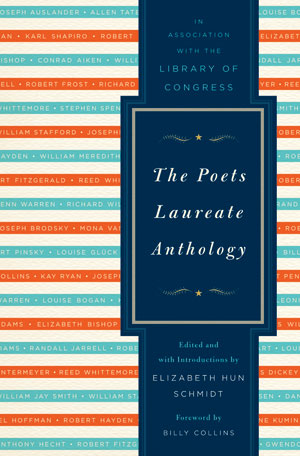
This is the beginning of what appears to be a great year for poetry in our lives.
Someone finally had the sense to gather in one compendium, the poems of all the American poets who have been appointed over the last 75 years to the office of “Poet Laureate.” The sensible one here is Elizabeth Hun Schmidt, “Forwarded” and abetted by none other than justly-popular poet, Billy Collins (who held the Poet Laureate office from 2001 until 2003). The book is a treasure trove for those who love American poetry (legions, I know). The surprise is that the book, while presenting some of the best poetry by the normal suspects of 20th and 21st Century American poetry (Frost, Lowell, Bishop, Williams, Lowell, Kumin, Brodsky, Haas, Gluck, Pinsky, Merwin, etc.), manages to introduce us to some great poetry from poets that were previously unfamiliar to us (we’re ashamed to admit: Kay Ryan, Rita Dove, Stephen Spender, Leonie Adams and Louise Bogan).
Below is a sampling of our favorites from this fine collection. Please give a close read, and give poetry a chance to immeasurably illumine this life.
The first reminds us of the Hardly Strictly Bluegrass Festival, the Live Oak Festival and other enchanting environs where folk music flourishes.
Song from a Country Fair
by Léonie Adams
Solitary Observation Brought Back from a Sojourn in Hell
by Louise Bogan
At midnight tears
Run in your ears.
Halley’s Comet
By Stanley Kunitz
Miss Murphy in first grade
wrote its name in chalk
across the board and told us
it was roaring down the stormtracks
of the Milky Way at frightful speed
and if it wandered off its course
and smashed into the earth
there’d be no school tomorrow.
A red-bearded preacher from the hills
with a wild look in his eyes
stood in the public square
at the playground’s edge
proclaiming he was sent by God
to save every one of us,
even the little children.
“Repent, ye sinners!” he shouted,
waving his hand-lettered sign.
At supper I felt sad to think
that it was probably
the last meal I’d share
with my mother and my sisters;
but I felt excited too
and scarcely touched my plate.
So mother scolded me
and sent me early to my room.
The whole family’s asleep
except for me. They never heard me steal
into the stairwell hall and climb
the ladder to the fresh night air.
Look for me, Father, on the roof
of the red brick building
at the foot of Green Street—
that’s where we live, you know, on the top floor.
I’m the boy in the white flannel gown
sprawled on this coarse gravel bed
searching the starry sky,
waiting for the world to end.
Daystar
by Rita Dove
She wanted a little room for thinking:
but she saw diapers steaming on the line,
a doll slumped behind the door.
So she lugged a chair behind the garage
to sit out the children’s naps
Sometimes there were things to watch–
the pinched armor of a vanished cricket,
a floating maple leaf. Other days
she stared until she was assured
when she closed her eyes
she’d only see her own vivid blood.
She had an hour, at best, before Liza appeared
pouting from the top of the stairs.
And just what was mother doing
out back with the field mice? Why,
building a palace. Later
that night when Thomas rolled over and
lurched into her, she would open her eyes
and think of the place that was hers
for an hour–where
she was nothing,
pure nothing, in the middle of the day.
Love Song
by Joseph Brodsky
If you were drowning, I’d come to the rescue,
wrap you in my blanket and pour hot tea.
If I were a sheriff, I’d arrest you
and keep you in the cell under lock and key.
If you were a bird, I ‘d cut a record
and listen all night long to your high-pitched trill.
If I were a sergeant, you’d be my recruit,
and boy i can assure you you’d love the drill.
If you were Chinese, I’d learn the languages,
burn a lot of incense, wear funny clothes.
If you were a mirror, I’d storm the Ladies,
give you my red lipstick and puff your nose.
If you loved volcanoes, I’d be lava
renlentlessly erupting from my hidden source.
And if you were my wife, I’d be your lover
because the church is firmly against divorce.
Money
by Howard Nemerov
an introductory lecture
This morning we shall spend a few minutes
Upon the study of symbolism, which is basic
To the nature of money. I show you this nickel.
Icons and cryptograms are written all over
The nickel: one side shows a hunchbacked bison
Bending his head and curling his tail to accommodate
The circular nature of money. Over him arches
UNITED STATES OF AMERICA, and, squinched in
Between that and his rump, E PLURIBUS UNUM,
A Roman reminiscence that appears to mean
An indeterminately large number of things
All of which are the same. Under the bison
A straight line giving him a ground to stand on
Reads FIVE CENTS. And on the other side of our nickel
There is the profile of a man with long hair
And a couple of feathers in the hair; we know
Somehow that he is an American Indian, and
He wears the number nineteen-thirty-six.
Right in front of his eyes the word LIBERTY, bent
To conform with the curve of the rim, appears
To be falling out of the sky Y first; the Indian
Keeps his eyes downcast and does not notice this;
To notice it, indeed, would be shortsighted of him.
So much for the iconography of one of our nickels,
Which is now becoming a rarity and something of
A collectors’ item: for as a matter of fact
There is almost nothing you can buy with a nickel,
The representative American Indian was destroyed
A hundred years or so ago, and his descendants’
Relations with liberty are maintained with reservations,
Or primitive concentration camps; while the bison,
Except for a few examples kept in cages,
Is now extinct. Something like that, I think,
Is what Keats must have meant in his celebrated
Ode on a Grecian Urn.
Notice, in conclusion,
A number of circumstances sometimes overlooked
Even by experts: (a) Indian and bison,
Confined to obverse and reverse of the coin,
Can never see each other; they are looking
In opposite directions, the bison past
The Indian’s feathers, the Indian past
The bison’s tail; (c) they are upside down
To one another; (d) the bison has a human face
Somewhat resembling that of Jupiter Ammon.
I hope that our studies today will have shown you
Something of the import of symbolism
With respect to the understanding of what is symbolized.
I Think Continually of Those Who Were Truly Great
By Stephen Spender
I think continually of those who were truly great.
Who, from the womb, remembered the soul’s history
Through corridors of light where the hours are suns
Endless and singing. Whose lovely ambition
Was that their lips, still touched with fire,
Should tell of the Spirit clothed from head to foot in song.
And who hoarded from the Spring branches
The desires falling across their bodies like blossoms.
What is precious is never to forget
The essential delight of the blood drawn from ageless springs
Breaking through rocks in worlds before our earth.
Never to deny its pleasure in the morning simple light
Nor its grave evening demand for love.
Never to allow gradually the traffic to smother
With noise and fog the flowering of the spirit.
Near the snow, near the sun, in the highest fields
See how these names are feted by the waving grass
And by the streamers of white cloud
And whispers of wind in the listening sky.
The names of those who in their lives fought for life
Who wore at their hearts the fire’s center.
Born of the sun they traveled a short while towards the sun,
And left the vivid air signed with their honor.
In addition to these great poets and poems, we were struck by a portion of the introduction to the collection. In these times and with recent political events and histrionics we would all do well to stop, read and consider the words of John F. Kennedy and the verses of Robert Frost, who was Poet Laureate from 1958-1959, and whom JFK invited to speak at Kennedy’s Inauguration in 1961. Kennedy had this to say:
“I asked Robert Frost to come and speak at the Inauguration…because I felt he had something important to say to those of us who are occupied with the business of G0vernment, that he would remind us that we are dealing with life, the hopes and fears of millions of people…. He said it well in a poem called “Choose Something Like a Star,” in which he speaks of the fairest star in sight and says:
It asks a little of us here.
It asks of us a certain height,
So when at times the mob is swayed
To carry praise or blame too far,
We may choose something like a star
To stay our minds on and be staid.
In other words, let us be methodical and slower to anger, and let us resist the urge to canonize or excoriate. Instead, let’s be thoroughly thoughtful and give wisdom at least a toehold’s chance before speaking or acting rashly. We have miles to go on this front before we sleep (yours truly, especially).
And as for poetry itself, in Tom Stoppard’s play “The Real Thing,” the main character has this to say: “I don’t think writers are sacred, but words are. They deserve respect. If you get the right ones in the right order, you can nudge the world a little, or make a poem children will speak for you when you’re dead.”
We hope that poetry will nudge your world a little this year.
Nov
The Writer’s Almanac On Election Day (and Every Day Hereafter)
by Lefort in Poetry

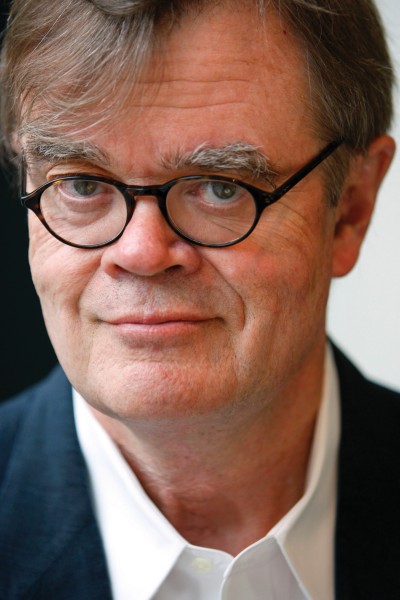
As we’ve written about before, Garrison Keillor is a national treasure. He is for us America’s Lifetime Entertainer Laureate.
If you haven’t checked it out before, check out Keillor’s stellar daily dose of poetry, prose and literary history here at The Writer’s Almanac. Today’s offering gives us the following C.G. Hanzlicek poem:
“To Be a Danger
Just once I’d like to be a danger
To something in this world,
Be hunted by cops
And forced into hiding in the mountains,
Since if they left me on the streets
I’d turn the country around,
Changing everyone’s mind with a word.
But I’ve lived so long a quiet life,
In a world I’ve made small,
That even my own mind changes slowly.
I’m a danger only to myself,
Like the daydreaming night watchman
Smoking his cigar
Near the dynamite shed.
“To Be a Danger” by C.G. Hanzlicek, from The Cave. © University of Pittsburgh Press, 2001.”
Aug
Backyard Vowels–The Poetry of Paul J. Willis
by Lefort in Poetry

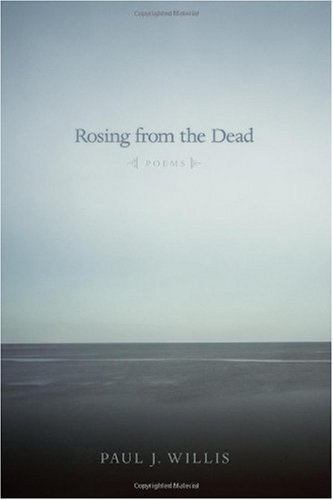
We are constantly amazed by the many talents and resources to be found in and around Santa Barbara.
This happened once again recently when we were grazing through our (phenomenal) Public Library and discovered, prominently displayed amongst the “Staff Picks” shelves, the latest p0etry collection of Westmont English professor, Paul J. Willis, entitled “Rosing from the Dead.” It turns out you don’t have to sail alone around the room or to the moon to find great poetry. It is here, being conjured in our own backyard, by Paul Willis, along with many others such as Perie Longo and David Starkey. You can get a good flavor for the local talent here and can catch up on the Santa Barbara Poet Laureate effort here.
The poems and writings of Paul Willis have been featured, amongst other places, on Verse Daily and Garrison Keillor’s The Writer’s Almanac, and in The Best American Poetry 1996, Image, Poetry, and The Best American Spiritual Writing 2004 (Houghton Mifflin) .
In “Rosing from the Dead,” Willis uses the platforms of his family life, work at Westmont, hiking adventures and faith as subject matter from which to leap into the poetic realm. There is abundant humor, darkness, beauty and wonder strewn throughout these fine poems. We highly recommend you seek out “Rosing from the Dead.”
Below are two poems from this worthy collection (used by kind permission of the author).
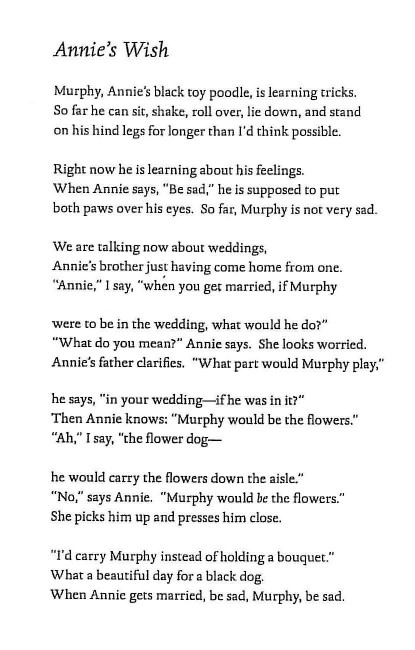
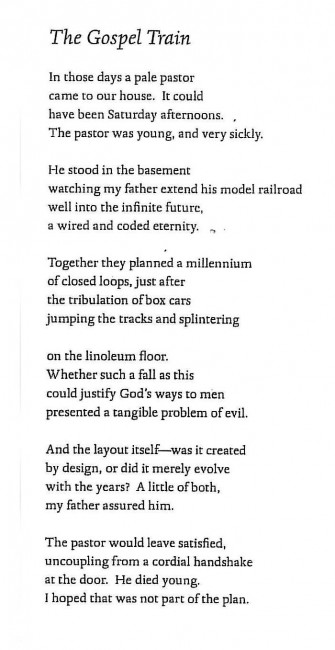
Jul
Spam: Health and Opportunities Lost
by Lefort in Poetry


We have a love/hate relationship with our spam filter. We love it until it erroneously cordons off an invaluable missive from a friend (or foe/faux, you know who you are), and then we hate it.
But what we meant to say is, check out this great poem by the great Bob Hicok (again):
Spam leaves an aftertaste
What does the Internet know that it sends me
unbidden the offer of a larger penis?
I’m flattered by the energy devoted
to the architecture of my body.
Brain waves noodling on girth, length, curvature
possibly, pictures drawn on napkins
of the device, teeth for holding, cylinder–
pneumatic, hydraulic–for stretching
who I am into who I shall be. But of all
messages to drop from the digital ether,
hope lives in the communiqué that I can find
out anything about anyone. So I’ve asked:
who am I, why am I here, if a train
leaving Chicago is subsidized
by the feds, is the romance of travel
dead? I’d like the skinny on where I’ll be
when I die, to have a map, a seismic map
of past and future emotions, to be told
how to keep the violence I do to myself
from becoming the grenades I pitch
at others. The likes of Snoop.com
never get back to me, though I need
to know most of all if any of this helps.
How we can scatter our prayers so wide,
if we’ve become more human or less
in being able to share the specific
in a random way, or was it better
to ask the stars for peace or rain,
to trust the litany of our need
to the air’s imperceptible embrace? Just
this morning I got a message
asking is anyone out there. I replied
no, I am not, are you not there too,
needing me, and if not, come over, I have
a small penis but aspirations
for bigger things, faith among them,
and by that I mean you and I
face to face, mouths
making the sounds once known
as conversation.
Jun
On Father’s Day
by Lefort in Poetry
Bob Hicok is one of America’s finest contemporary poets. We have been drunk on his poetry of working folks, family, beauty and humankind. He covers the entire emotional waterfront–from the sailor agonizingly missing the last saving line that would pull him to shore, to the Chaplin-esque figures tumbling humorously into life’s rich harbors, Hicok throws his net wide.
Elizabeth Gaffney, in the New York Times Book Review, described his skills as being “somewhere . . . between those of the surgeon and the gods of the foundry and convalescent home: seamlessly, miraculously, his judicious eye imbues even the dreadful with beauty and meaning.”
On this day, we read and re-read his hilarious and touching poem, Oh my pa-pa.
O my pa-pa
by Bob Hicok


